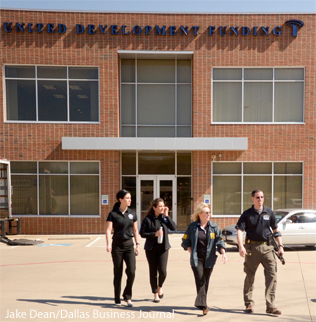By Natalie Posgate of The Texas Lawbook and Candace Carlisle of the Dallas Business Journal
The heated, two-year multimillion-dollar feud between United Development Funding and Dallas hedge fund manager Kyle Bass erupted again last week and shows no signs of cooling off.
UDF filed an explosive 61-page civil lawsuit Nov. 28 claiming Bass and his hedge fund, Dallas-based Hayman Capital Management, mounted an illegal campaign to spread false information about the publically-traded real estate investment trust and its affiliates in an effort to reap huge financial gains by short-selling shares of UDF.
Additionally, The Texas Lawbook has learned that the U.S. Securities and Exchange Commission will likely decide in the next few weeks whether to levy civil charges against UDF. Lawyers close to the investigation say that SEC officials are leaning toward a finding of negligence – not fraud.
At the same time, the FBI and federal prosecutors remain “very active” in their investigation of UDF, according to lawyers familiar with the government inquiries.
The lawsuit by UDF and its umbrella of REIT affiliates seems to be part of a continued effort to deny allegations of misconduct levied by Hayman Capital. The lawsuit shows UDF intends to fight any charges brought by federal officials, according to multiple lawyers.
UDF spokesman Jeff Eller said, “it would not be appropriate to comment on the litigation at this time. The reasons for bringing the lawsuit are fully stated in the complaint.”
In the lawsuit, filed in Dallas County court, UDF claims Hayman Capital took a position shorting UDF stock and then created a “tabloid-style website” in late 2015 to spread incorrect information about UDF’s financials by suggesting the REIT operates like a Ponzi scheme.
The Grapevine-based residential lender also claims in the lawsuit that Hayman Capital’s former general counsel, Christopher Kirkpatrick, who was an enforcement lawyer with the SEC’s Fort Worth regional office in the 1990s, supplied false information about UDF to his former SEC colleagues and the FBI in an effort to get the agencies to open investigations.

According to the filing, Kirkpatrick “abruptly” left his position with Hayman Capital after the FBI raided UDF’s corporate office in February 2016. By October of that year, the lawsuit claims Bass closed out his short positions in UDF IV, the largest in UDF’s umbrella of REIT funds that began listing on the NASDAQ in mid-2014 .
“Because UDF was not the worthless Madoff-like business fraud that defendants made it out to be, UDF survived,” the UDF lawsuit states. “Defendants’ almost year-long campaign of lies severely damaged UDF’s ability to carry on its business while at the same time profiting defendants by an estimated $60 million or more.”
In the filing, UDF claims Bass took a short position of 4 million shares when UDF IV was trading at over $17 per share, purchasing them back for as low as $1 per share, which resulted in a profit of more than $60 million.
Bass has repeatedly declined to disclose his short positions in UDF, but in February 2016, he admitted to multiple media outlets that he had positions in UDF and intended to profit from them.
“We don’t ever disclose our positions to anyone — and won’t — but as you can see we are spending a lot of time and resources on this,” he told the Dallas Business Journal.
Hayman Capital vehemently denies the allegations made in the UDF lawsuit.
“It is our strong belief that this lawsuit is without merit, and is intended to distract and deflect from UDF’s other problems, including significant investor litigation and law enforcement issues,” Hayman Capital General Counsel and Chief Compliance Officer Blake Jones said in a written statement to The Texas Lawbook. “We look forward to addressing those allegations in open court and firmly believe that we will prevail on all those claims.”

Michael K. Hurst and Jeremy Fielding of Lynn Pinker Cox & Hurst and Cole Ramey of Kilpatrick Townsend said they will be defending Bass and Hayman in UDF’s lawsuit.
“Faced with legitimate questions about its business and mounting investigations and litigation, UDF has resorted to blaming others for its problems,” Hurst said in a written statement. “Here, none of the crucial facts are disputed.”
Hurst said the website, UDFEXPOSED.com, simply detailed for the public the extent of the investigation into UDF, which he said was important to potential investors.
“UDF’s recent actions provide no evidence to refute our client’s previous work and their opinions, and amount to mere finger-pointing in advance of UDF’s reported imminent meetings and negotiations with federal investigators and law enforcement authorities. We look forward to mounting a vigorous defense to UDF’s baseless allegations,” Hurst maintained.
The Texas Lawbook has learned that senior UDF officials, including CEO Hollis Greenlaw and CFO Cara Obert, are scheduled to meet with senior level SEC officials in two weeks in a last-ditch effort to try to convince the federal agency to not bring charges against them. The meeting, according to multiple lawyers with extensive knowledge of case, will involve SEC officials from Washington, D.C. and the Fort Worth Regional Office, which is leading the investigation.
UDF is expected to present a “nothing to see here defense,” lawyers say, while trying to direct the SEC to focus instead on the conduct of Hayman Capital and Bass, according to multiple lawyers.
“I don’t think that argument is going to fly,” one of those lawyers told The Texas Lawbook on the condition of anonymity, who added that the SEC seems laser-focused on UDF.
Another lawyer familiar with the SEC inquiry said, “UDF is coming into the meeting seeking exoneration, while the SEC wants to get a plea or settlement agreement.”
Lawyers familiar with the investigation say the agency will “most likely” accuse UDF of negligence, not fraud, because it will be an easier charge to prove in court. The sources say that the SEC will want “a significant amount of money” through a fine or penalty.
There is seemingly a renewed interest by the FBI and the U.S. Department of Justice in the allegations being tossed around by Hayman and UDF. U.S. Attorney Nick Bunch of the Northern District of Texas is overseeing the investigation.

The SEC inquiry is being led by assistant enforcement director Eric Warner and staff attorneys David Whipple and David Hirsch. Lawyers say that Fort Worth Regional Director Shamoil Shipchandler and Associate Regional Director Jessica Magee are also heavily involved in the case.
UDF is represented in the SEC investigation by Bracewell Partner Barrett Howell, while Bracewell partners Joe Cox and Andrea Broyles also represent the company. The attorneys representing the REIT declined comment.
Legal sources say UDF probably filed the civil case against Hayman Capital last week because it faced an upcoming two-year statute of limitations. One source questioned the “wisdom of this filing” because it could grant Hayman Capital access to crucial financial information and put UDF executives under oath.

Bass and Hayman are known in the investment world for their expertise in short-selling, an investment tactic employed by many hedge funds that bet on a company stock declining. Most notably, he is known for his bet against subprime mortgages that were at the center of the U.S. financial crisis of 2008.
In the lawsuit, UDF claims that Bass went after the publicly-traded REIT because he was “under tremendous pressure” in 2015 after a couple of failed short-selling bets, including positions against pharmaceutical companies such as Biogen, Bristol-Myers, Celgene and others.
Last year, Bass told the Dallas Business Journal that UDF was operating in a $1 billion, “Ponzi-like scheme” that had the ability to impact some of North Texas’ big residential projects.”
“UDF IV has two-thirds of its loans with a single borrower, in one market,” Bass told the DBJ. “That level of credit concentration — regulated or unregulated — raises a red flag. A credible financial institution or lender would not put themselves in that position.”
Bass said his actions were meant to protect additional UDF investors from losing money.
“If you asked me how much money we are saving UDF investors from investing in UDF V, I’d say we are saving them $1 billion, which is what they were looking to raise for the funds and are now having a lot of trouble doing so,” Bass told the DBJ last year.
According to the lawsuit, two years ago, Bass began publishing anonymous posts attacking UDF and its affiliates under the blogger name Ernest Poole on the Harvest website, an online community for financial firms and advisors. He later confirmed in Feb. 2016 that his company, Hayman Capital, was behind the web posts.
He then launched a Hayman Capital-sponsored website called UDFexposed.com, which published multiple case studies that questioned UDF’s financials tied to real estate projects, including residential developments throughout Texas. At UDFexposed.com, Hayman Capital called the REIT a “billion-dollar house of cards.”
In that same month, the FBI raided UDF’s corporate headquarters in Grapevine, seizing boxes of documents and other assets.

UDF IV’s shares plummeted in the wake of Hayman Capital’s accusations and the FBI raid. It didn’t take long before shareholders began filing class action lawsuits. Nasdaq later delisted UDF IV for failure to meet deadlines on regulatory documents.
The aftermath led to lenders pulling UDF credit lines and denying extensions. And UDF executives the negative impacts to the business stemmed from Bass’ “personal hostility,” to UDF CEO Greenlaw.
According to the lawsuit, the alleged friction between Bass and Greenlaw stemmed from multiple showdowns for real estate investments in North Texas and elsewhere.
